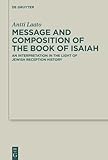Message and Composition of the Book of Isaiah : An Interpretation in the Light of Jewish Reception History / Antti Laato.
Material type: TextSeries: Deuterocanonical and Cognate Literature Studies ; 46Publisher: Berlin ; Boston : De Gruyter, [2022]Copyright date: ©2022Description: 1 online resource (XI, 331 p.)Content type:
TextSeries: Deuterocanonical and Cognate Literature Studies ; 46Publisher: Berlin ; Boston : De Gruyter, [2022]Copyright date: ©2022Description: 1 online resource (XI, 331 p.)Content type: - 9783110761634
- 9783110761863
- 9783110761818
- BS1515.52 .L33 2022
- online - DeGruyter
- Issued also in print.
| Item type | Current library | Call number | URL | Status | Notes | Barcode | |
|---|---|---|---|---|---|---|---|
 eBook
eBook
|
Biblioteca "Angelicum" Pont. Univ. S.Tommaso d'Aquino Nuvola online | online - DeGruyter (Browse shelf(Opens below)) | Online access | Not for loan (Accesso limitato) | Accesso per gli utenti autorizzati / Access for authorized users | (dgr)9783110761818 |
Frontmatter -- Foreword -- Contents -- 1 Introduction -- 2 “Hezekiah did not Hymn” – The Pro-Hezekiah Reception of the Book of Isaiah -- 3 “Sometimes Their Eyes Were Opened, and Sometimes They Were Blinded” – The Book of Isaiah and the Eschatological Plan of Salvation -- 4 “Holy Seed” – The Books of Isaiah and Ezra – Nehemiah -- 5 Understanding the Message and the Composition of the Book of Isaiah -- 6 Bibliography -- Index of References -- Index of Modern Authors
restricted access online access with authorization star
http://purl.org/coar/access_right/c_16ec
The study deals with the theological message and composition of the Book of Isaiah and promotes a thesis that an early Jewish reception history helps us to find perspectives to understand them. This study treats the following themes among others:1 Hezekiah as Immanuel was an important theme in the reception as can be seen in Chronicles and Ben Sira as well as in rabbinical writings. The central event which makes Hezekiah such an important figure, was the annihilation of the Assyrian army as recounted in Isaiah 36-37.2 The Book of Isaiah was interpreted in apocalyptic milieu as the Animal Apocalypse and Daniel show. Even though the Qumran writings do not provide any coherent way to interpret Isaianic passages its textual evidence shows how the community has found from the Book of Isaiah different concepts to characterize the division of the Jewish community to the righteous and sinful ones (cf. Isa 65-66).3 Ezra and Nehemiah received inspiration from the theological themes of Isaianic texts of Levitical singers which were later edited in the Book of Isaiah by scribes. The formation of the Book of Isaiah then went in its own way and its theology became different from that in the Book of Ezra–Nehemiah.
Issued also in print.
Mode of access: Internet via World Wide Web.
In English.
Description based on online resource; title from PDF title page (publisher's Web site, viewed 02. Mai 2023)


